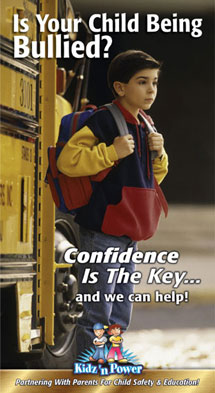
Put an End to School Yard Bullies –
Part ONE
By Shei Franco
Reading, writing, arithmetic, name calling, teasing and pushing. They all have something in common.
You might be surprised to know they all are taught in school.
Perhaps only three are actually part of the curriculum, but the rest are just as prevalent. Even if a child is not the victim of harassment, chances are he has witnessed students under attack.
For some parents, the topic of bullying seems irrelevant. After all, the sweetly dressed 5–year-old at the bus stop can't possibly be a threat. But, according to Lori Linden, an elementary school guidance counselor in Millcreek, Pa., bullying can start at any age. “As early as kindergarten, [there is] pushing in line and making demands to other children,” Linden says.
How Bullying Starts
Teachers and parents need to identify children who bully. Classroom and household sanity depends on it. While most parents concentrate on whether their child is being bullied, they should not ignore the possibility that the bully might belong to them.
“The bully usually exhibits disrespectful behavior, in general, to peers, teachers and others,” says Brien O'Callaghan, a clinical psychologist and marriage and family counselor, in Bethel, Conn. “The disrespect may be obvious or subtle. There is usually an arrogant, know–it–all, sarcastic attitude. There are also usually other signs like academic underachievement, other misbehaviors like stealing and a pattern of making excuses for misbehavior and blaming others.”
While these signs indicate an underlying character issue, O'Callaghan adds that nothing is certain. “It is important to note that it is also possible that the bully will keep a low profile and not be easily identified,” he says.
How to Tell
Most parents do not witness their child being bullied. They believe, in good faith, that a teacher or adult that cares for their child will notify them of any harassment. Unfortunately, that doesn't always happen.
How, then, can parents know when their child is being bullied?
O'Callaghan warns that uncovering the victim is not always easy. He points out the child may feel embarrassed, threatened or may simply believe that her claims will fall on deaf ears.


